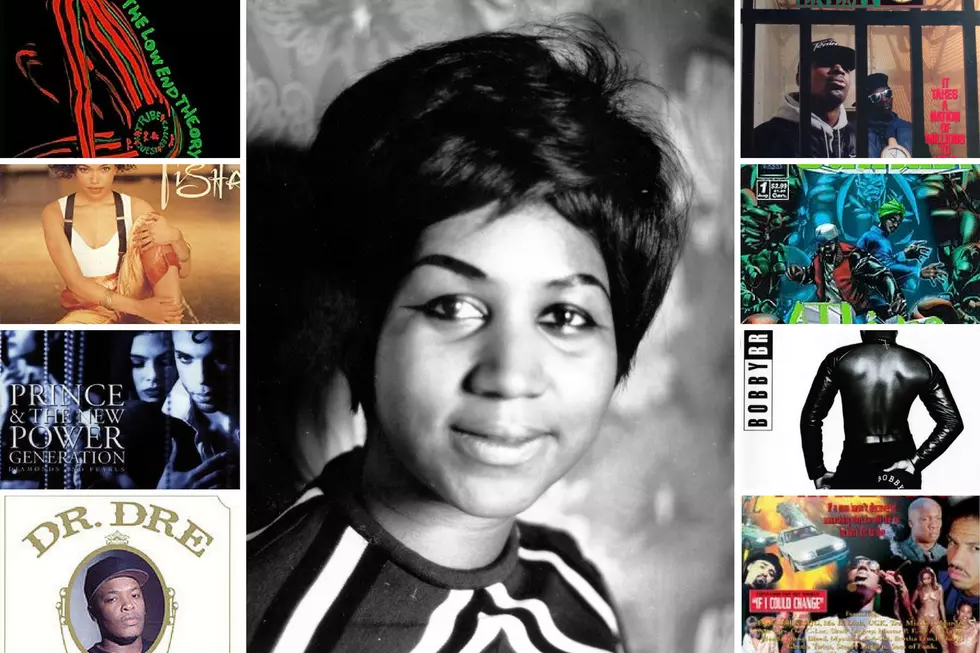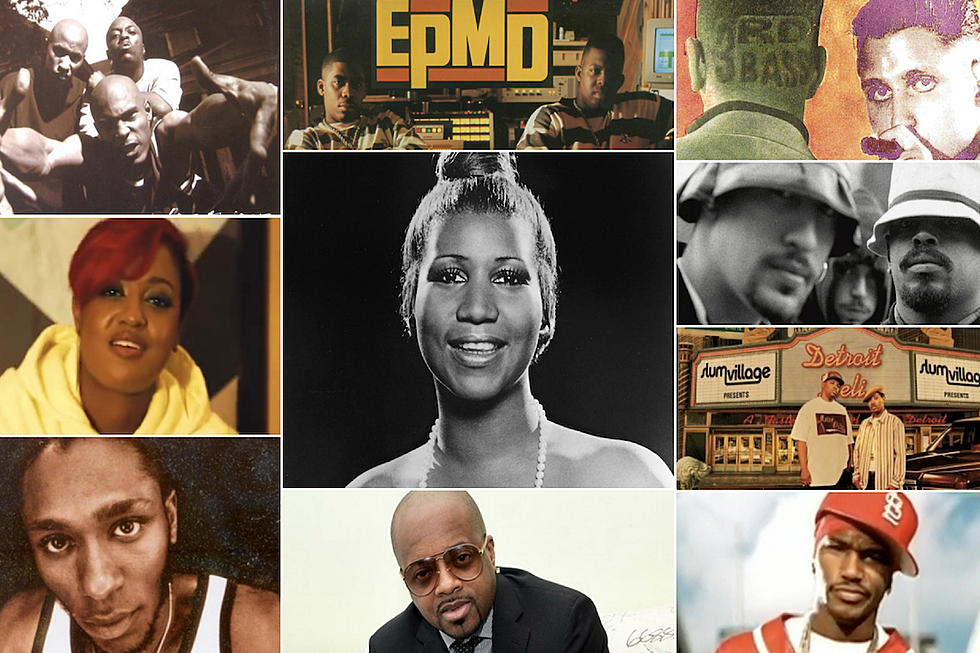
‘Yo! Bum Rush the Show’ at 30: Public Enemy Announced Themselves as Sonic Revolution
"We got the shit that you just can't fuck wit..." - Flavor Flav ("Too Much Posse")
Public Enemy's debut album dropped like an atomic bomb in February 1987. It wasn't the big commercial seller like later P.E. albums such as It Takes A Nation of Millions To Hold Us Back and Fear of A Black Planet, but it hit hard for hip-hop heads at a time when the genre was becoming more visible than it had ever been. Rap music had a mainstream foothold now, and it was the perfect time for an artist such as Chuck D to emerge with a voice and a perspective as unique as it was necessary.
Since 1984, hip-hop acts had become more and more visible. Run-D.M.C. dropped their debut album that year, and became the first rap act to get consistent airplay on MTV. Their platinum-selling follow-up, King of Rock, arrived in 1985, as did LL Cool J's hit debut album Radio. In 1986, Raising Hell became Run-D.M.C.'s best-selling album and the first rap album to go multi-platinum; as did Licensed To Ill, the debut album from the Beastie Boys.
Long Island natives Carlton Ridenhour and William Drayton had known each other while Ridenhour was attending Adelphi University. While DJing for WBAU, Ridenhour rechristened himself "Chuck D," and Chuck formed a collective of musicians known as Spectrum City, which included brothers Hank and Keith Shocklee, Eric "Vietnam" Sadler, Drayton (aka "Flavor Flav") and another emcee named Aaron Allen (aka Butch Cassidy.) They released the single "Check Out the Radio/Lies" in 1984. The record gained notice around New York City, and Chuck would team with Flav again to record "Public Enemy No. 1," an anthem aimed at announcing Chuck as the most formidable rapper on the local scene. It led to former WBAU director Bill Stephney working with Def Jam Recordings' Rick Rubin to sign this new rapper, Chuck D.
When Rubin approached Chuck with a deal, he refused to sign as a solo artist, insisting that he bring along his Spectrum City co-horts—including affiliate Richard "Professor Griff" Griffin and Norman Rogers, a local DJ known as Terminator X. Chuck was also uncertain about his age. In 1986, a 27-year old making his debut as a rapper was an anomaly.
"I contacted Chuck about signing them, and he said no, that he was too old, and hip-hop was a young man's game," Rubin recalled in 2005 interview with A.V. Club. "LL was really popular at that time, and he was 16. Chuck was an old man, probably 21 (editors note: he was actually 26). He felt like his artist days were past him. I put his number up on a post-it note on my phone, and I would call it every day and just keep bugging him. We wanted to put out music, and we were having great success, and there was nothing good. And here was something good. Finally, one day, after months, he came in with Flavor Flav—I don't think Griff was there yet—and said, 'Okay, I'm ready to do it. It's called Public Enemy. Here's the whole vision.' He had it all worked out. They weren't going to be like any other hip-hop group. They were going to be more like The Clash. They were going to have lyrics that meant something, and uniforms, and a militaristic feel, the whole thing."
Public Enemy would be the collective's moniker, with the Shocklee brothers forming The Bomb Squad with Adler, a production crew responsible for helming the group's sound. Flav served as the comedic foil to Chuck—a move that Rubin initially hated but what would ultimately give the group its unique dynamic. They spent most of 1986 hemmed up in their Hempstead studio, recording what would become their debut album. Released on February 10, 1987, Yo! Bum Rush the Show was nothing short of a revelation.
The New York Times wrote that "While they don't usually get preachy about it, they make it clear that they're also speaking for an embattled black underclass, shown as targets on the album's cover and inner sleeve. With Bernhard Goetz currently on trial for shooting four young black men in the subway, and with the Howard Beach racial incident still in the air, Public Enemy can't help being topical."
Yo! Bum Rush the Show features Chuck D. and Public Enemy still audibly connected to the hardcore B-boyism that had been highlighted by Run-D.M.C. and LL Cool J. The heightened awareness is already there (Chuck makes numerous references to his disdain for alcohol and cigarettes), but there's just as much time devoted to riding around in a fly car ("You're Gonna Get Yours") or hanging with the crew ("Too Much Posse").
The noisy, sample-heavy sound of the Bomb Squad's distinctive production isn't so omnipresent on Yo! Bum Rush the Show. There's still a lot of stripped boom-bap here; the sound isn't all that removed from contemporaneous music from Boogie Down Productions. And like KRS-One on the uber-classic Criminal Minded, Chuck D's persona on Yo! is more tied to street tales than some of P.E.'s latter music. But that's not to say Chuck was devoid of consciousness in his earliest days—he had something to say and he knew how to say it.
"You're Gonna Get Yours" is one of hip-hop's greatest opening tracks. "Suckers to tha side, I know ya hate, my '98" was a great ode to the Oldsmobile towncar, P.E.'s entry into the long-standing tradition of indelible car songs. It's an almost light-hearted moment from a group that would become famous for stone-faced seriousness. It's followed by "Sophisticated Bitch," an unapologetic slice of misogyny that features Chuck wagging his finger at a boujee young lady. The contempt is obvious, and N.W.A.'s even more brash woman-bashing was still a year away. Hip-hop and misogyny aren't exactly strange bedfellows, and P.E. was no exception.
The slow, chugging "Miuzi Weighs a Ton" is one of P.E.'s best songs; a menacing track that features Flav urging Chuck to "run a power move on 'em," as Chuck's booming baritone takes over the track, rapping: "It's a big wonder why I haven't gone under/Dodgin' all types of microphone thunder/A fugitive missin' all types of hell/All this because I talk so well."
"Timebomb" has one of the slickest grooves on the album, with Chuck dropping wisdom about how "new is old" and "the people in the back let you know who's wack," while admitting that "the one who makes the money is white, not Black." It's another great track that features Chuck describing the b-boy scene from an insider perspective, while also shouting out "Panther Power" and dismissing those who wrecked South Africa. But he's still mackin' on the ladies: "I'll be the burger, you can be the bun, girl--surrounding my steady pounding."
"Too Much Posse" highlights Flav's drumming and his off-kilter rhymes. Flavor Flav showcases can be hit or miss, but the simplicity of "...Posse" is a perfect fit for his comedic storytelling, even if it isn't quite the home run he would hit on later cuts like "911 Is A Joke" and "Can't Do Nuttin' For Ya."
"Rightstarter (Message To A Black Man)" is the most explicitly political moment, and it's an obvious forerunner to what P.E. would perfect on It Takes A Nation... a year later. The beat is as loose and aggressive as anything on the album, as Chuck rails against those are comfortable to just keep "going, not knowing about your past—now you're looking pretty stupid while ya shakin' ya ass." It's one of the most clear-eyed examples of commentary from P.E.'s earliest days on wax.
"Public Enemy, No. 1" is the album's best track and it was an early solo performance by Chuck. With its squealing synths and thumping drums, it's an undeniable anthem for both the group and its frontman. For his first major creative statement, Chuck's vision is so fully realized here; one could argue that his age was a major part in sharping his perspective.
"Raise the Roof" sounds the most like mid-80s LL and Run-D.M.C., with Chuck bragging about party-starting and the escape that hip-hop provides. "With the spot as hot as it can get/The roof's on fire, you're soaked and wet/The puzzle on your face shows as you sweat/But your body keeps movin' with no regrets." He name-drops Greek organizations at Black colleges, as he rhymes about bringing people together over the percolating beat. One of the best tracks on the album.
The title track is another example of the stripped-down aggression prevalent on the album. With Flav's always-reliable ad-libs ("I'll stomp a mudhole in ya ass, bitch!") and a sample of "Shack Up" by Banbarra, Chuck threatens to "get ill on a posse with my goddam hands" and blasts those who look at hip-hoppers with disdain and quite literally block entry. It's absolutely an anthem for kicking down any door that you can't get through.
"Megablast" is a clear predecessor to "Night of the Living Baseheads," an examination of drug addiction. Flav and Chuck chant the chorus in unison "Oh please, oh please, oh please, just gimme just one more hit." With backwards rhymes and ghostly production, it's a harrowing look that the rapper's complementary voices cut directly through. And the album closes with the obligatory DJ showcase, which in this case is the rhythmic "Terminator X Speaks With His Hands."
Public Enemy's opening salvo may not have been as world-changing as Run-D.M.C.'s first album or as big a commercial hit as the Beastie Boys' debut, but it was the most fully-developed hip-hop debut of the time—until Eric B. & Rakim's Paid In Full dropped a month later. And it announced Chuck D as a new kind of rapper, one who was focused on more than just bragging about mic skills and flashy clothes. What's most interesting about Yo! Bum Rush the Show, in hindsight, is how Chuck is still connected to those tropes even as he works to push beyond them. This is Chuck D at his most casual—but he's still a man of purpose. And he was just getting started.
More From TheBoombox









